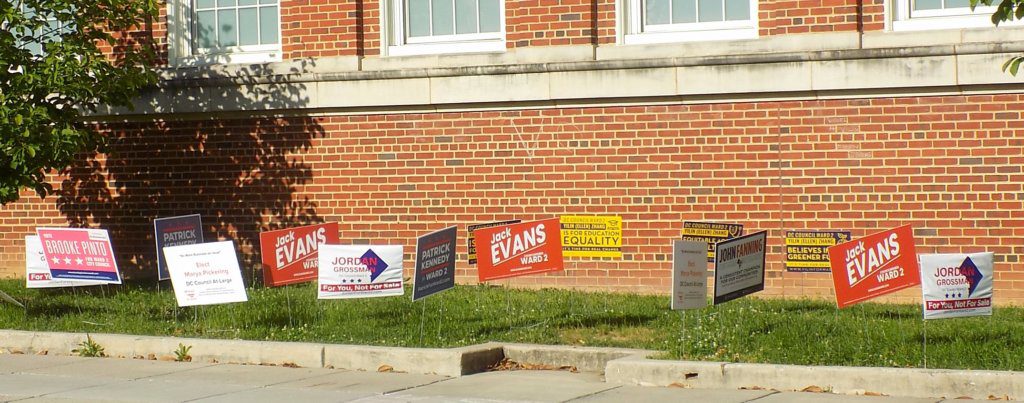Ward 2 Race Contributions, Controversies Heat Up
By • June 1, 2020 0 1139

In the days leading up to the June 2 primary election, candidates for the Ward 2 seat on the District Council were in the final sprint for campaign contributions. The race to see who can get the most contributions from whom is hot, and controversy is rising along with D.C.’s summer temperatures.
All but one of the eight Democratic candidates in the primary signed on to the District’s Fair Elections Program — a voluntary campaign-financing process that provides lump-sum base amounts to start a campaign and five-to-one public matching funds for candidates who pledge to only accept small donations ($50 or less).
That translates into a $250 matching contribution from public funds for a maximum $50 donation from a “Qualified Small Donor Contributor.” The maximum amount a candidate for a Ward Council seat may receive in matching payments for the 2020 election cycle is $241,055. The money cannot be used for a candidate’s personal expenses, such as clothing and campaign compensation for relatives (although family members can give the campaign up to $2,500 each).
Documentation and weekly reports of all campaign contributions are required; these are analyzed eagerly by supporters and rivals alike. Maps and graphs of all sorts have been produced charting the location and number of contributors, large and small, to each candidate. For instance, as of May 25, Keith C. Ivey of DC Geekery found that the nine candidates ranked as follows from the highest number of contributors to the lowest: Jordan Grossman, Kishan Putta, Patrick Kennedy, Brooke Pinto, John Fanning, Jack Evans, Yilin Zhang, Daniel Hernandez and Katherine Venice (the sole Republican candidate).
Pinto, who was endorsed by the Washington Post, did not sign on to the FEP and can accept contributions up to $500 from individuals and from organizations. The latter includes corporations, LLCs, PACs, unions and so on, which may not contribute to candidates pledging to take only small contributions. As such, writes Ivey, she can use as much of her own money as she wishes.
“Recent donor maps of Ward 2 show who has the most donor support in Georgetown,” candidate Putta, a member of ANC 2E, the Georgetown-Burleith advisory neighborhood commission, wrote The Georgetowner on May 26. “You may be surprised to see that it is me. Not just in Burleith … but I have more Georgetown support in both West Village and East Village and Waterfront. By far — much more.”
Candidate Kennedy, however, wrote The Georgetowner on May 29 that he had more donors overall. “I am proud to have the most local Ward 2 individual donors than any candidate in the race,” he stated.
But Kennedy has been accused by ANC 2B Commissioner Ed Hanlon of having benefited from some $100,000 in spending by a super PAC. “Kennedy has received over $170,000 in taxpayer money under the Fair Elections Act,” wrote Hanlon. According to Kennedy campaign officials, Hanlon is a provocateur who supports another candidate (Washington City Paper calls Hanlon “Dupont’s litigious advisory neighborhood commissioner”).
“I am dedicated to the Fair Elections Program and I have refused to accept any PAC or corporate funding,” wrote Kennedy, whose campaign spokespeople asserted, “By law, Patrick Kennedy cannot and will not get involved with outside groups like this.”
The FEP matching donation program, part of the Fair Elections Amendment Act of 2018, is administered by the Office of Campaign Finance within the District Board of Elections.
Mail-in ballots and pre-voting at some 22 centers around D.C., including Georgetown’s Hardy Middle School, began on May 22. All the candidates except Evans and Hernandez are running in the June 16 special election to fill the currently vacant Ward 2 seat until Jan. 20, 2021.

